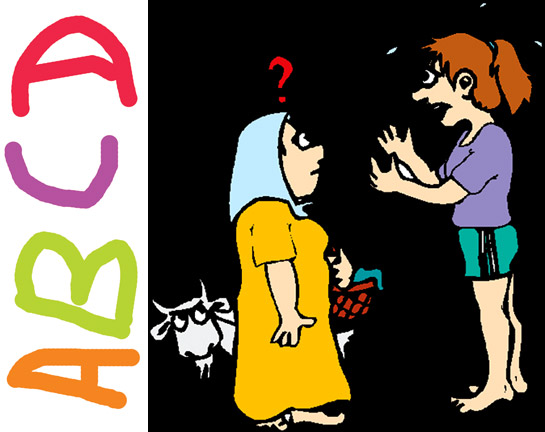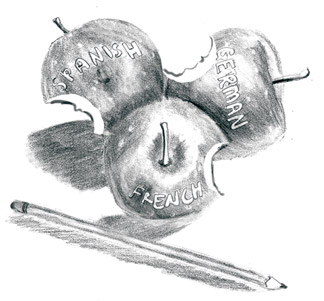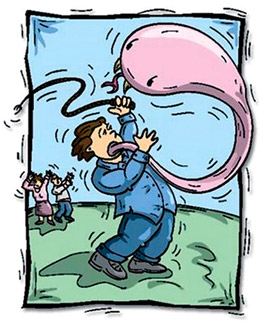No tongue like the mother tongue
by Sajitha PREMATUNGE
 Have
you ever felt the undeniable urge to add “no” at the end of most
sentences, when your English teachers have strictly advised against it?
Consequently Sinhala speakers opt to `isn’t it’, which is often used in
the wrong context. For instance they say “She is a teacher, isn’t it?”
or “He is going to the town isn’t it?” These are not too uncommon among
Sri Lankans who seek the satisfaction of precise expression. Have
you ever felt the undeniable urge to add “no” at the end of most
sentences, when your English teachers have strictly advised against it?
Consequently Sinhala speakers opt to `isn’t it’, which is often used in
the wrong context. For instance they say “She is a teacher, isn’t it?”
or “He is going to the town isn’t it?” These are not too uncommon among
Sri Lankans who seek the satisfaction of precise expression.
It originates not only from the difficulty experienced by Sri Lankan
speakers to express ideas more efficiently and accurately in a foreign
language, but due to the influence of our mother tongue, says Professor
D.C.R.A. Goonatilleke, Emeritus Professor of English, University of
Kelaniya.
Sri Lankans use “neda?” when talking in Sinhala for affirmation,
approval and as a query. Although we have been speaking English for
donkeys years the “neda?” or the lack of it thereof, in the English
Language, constantly nags at the back of the Sinhalese mind. But this is
by no means restricted to Sri Lankans. It’s clear by the characteristic
“no” at the end of each sentence of Spaniards, the French and Indians.
So we are not alone.
The French equivalent to “neda” is “n’est pas” and the Hindi
equivalent is “no”. The most striking resemblance between these and “no”
is the similarity of the syllables, proving that whatever language we
speak we tend to localize it. We feel very comfortable with our mother
tongue because that’s the language we are used to express our emotions.
However that is no warrant to use such tag questions, since it is a
deviation from the standard form.
However the alteration of a language once it reaches the rest of the
world is inevitable. The same goes for Queen’s English. In fact, there’s
nothing such as Queen’s English even in England. Languages are dynamic
we change it and make it all our own. In fact the English Language is
not solely English at all.
 From
time immemorial the English Language has been borrowing words from other
languages and it is an ongoing process. Normal English words like
avant-garde, brunette, chic, deja vu, rendezvous, armadillo, canyon,
vigilante, grotto, skipper, booze, voila, avatar, karma, jungle, loot,
curry, wigwam, tsunami and boomerang have been borrowed from other
languages. Asweddumize and water-cutting are some words that have been
borrowed by the English Language. From
time immemorial the English Language has been borrowing words from other
languages and it is an ongoing process. Normal English words like
avant-garde, brunette, chic, deja vu, rendezvous, armadillo, canyon,
vigilante, grotto, skipper, booze, voila, avatar, karma, jungle, loot,
curry, wigwam, tsunami and boomerang have been borrowed from other
languages. Asweddumize and water-cutting are some words that have been
borrowed by the English Language.
 Most
recent entries to Sri Lankan English include kusu kusufying,
rasthiyadufying and poojafy. Although the phrase funeral home is used by
many it is not an accepted coinage says Professor Goonatilleke. In an
attempt to `Sinhalafy’ English, we Sri Lankans have managed to pepper
Sri Lankan English with Sinhala and Tamil phrases and idioms. We often
end up using direct translations like `we’ll go and come’. This is
substandard as well, and some often end up making hilarious blunders,
like the all too familiar board hung on doors that say `enter from
behind’. Most
recent entries to Sri Lankan English include kusu kusufying,
rasthiyadufying and poojafy. Although the phrase funeral home is used by
many it is not an accepted coinage says Professor Goonatilleke. In an
attempt to `Sinhalafy’ English, we Sri Lankans have managed to pepper
Sri Lankan English with Sinhala and Tamil phrases and idioms. We often
end up using direct translations like `we’ll go and come’. This is
substandard as well, and some often end up making hilarious blunders,
like the all too familiar board hung on doors that say `enter from
behind’.
Mistranslations are another mistake that is common among Sinhala and
Tamil English speakers in Sri Lanka. Even English names are translated
into Sinhala, `Albert Chandrawankaya’ for Albert Crescent or the vice
versa - translating Sinhala into English - for example Universal joint
for `Sarwaloka puttuwa’.
But it has to be accepted that English does not allow us complete
freedom of expression. “For example the Sinhala Language has a very
elaborate kinship system, which is replaced in Sri Lankan English by
such terms as `cousin brother’ and `cousin sister’.” But as Prof.
Goonatilleke explained this does not qualify as a sound basis to claim
we have a variety of English all to our own.
But the major problem as Prof. Goonatilleke puts it is not so much
the mistakes made by Sri Lankan English speakers but linguists who
justify these attempts to localize English. “Although there are
instances some terms, phrases and words have been naturalized a
distinction has to be made between naturalization and mistakes” said
Prof. Goonatilleke. As he explained the problem arises when we attempt
to tamper with the morphology of grammar.
But Prof. Goonatilleke hopes for the best. Although the old community
spoke English of a certain standard, the current English speaking crowd
is going to have a beneficial impact on the English Language.
“There is bound to be a rise in quality because there will be a more
individualistic use of English.” |

